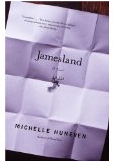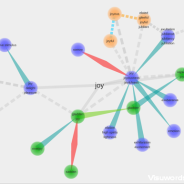Posted by Diane Morrow on December 8, 2008 in Uncategorized

A divine comedy? 2003 This is one of those books I came across by chance in the library. I read the back cover. Saw that the central character, Alice, was a descendant of William James. Saw that the San Francisco Chronicle called the book “joyous” and “good for what ails you.” The Atlantic Monthly said, “This divine comedy offers a glimpse of transcendence that’s refreshingly believable.” And thought, hey, why not? This was a few years ago. I liked the book quite a bit. Then last month I read it again and was delighted to find that it still holds up. The reviewers got it right. This is such a good novel. Such wonderfully quirky and likeable characters. Alice and Pete and Helen. If I could, I’d invite them all over for dinner, together. I’d ask Pete if maybe he’d consider cooking. Pete’s an excellent cook—a professional chef. (Think dishes like lamb tagine with dried figs. Or plum tart with lemon sorbet.) But he’s also a chef very much down on his luck. He’s lost his restaurant, his wife, and visitation rights with his young son. He’s had some anger issues. A suicide attempt. Now he’s forty-six years old and living with his widowed mother, a nun, who has been given a leave of absence from her convent in order to help him get back on his feet. Here is the passage in which Ms. Huneven deftly introduces us to Pete at the beginning of Chapter three. Pete Ross overslept. When he came into the living room, his mother was already on her knees at the neatly made sofa bed. Knuckles pressed to her forehead, she was conversing with her second husband, Jesus Christ, from whom she was temporarily and amicably separated. Not wanting to disturb his mother, Pete decides not to make coffee before setting out on one of his long walks through Los Feliz, along the river, asking the question he asks over and over throughout the novel: How do people live in this world? Pete has issues. But he’s working on them. This is Pete trying to sit still. After his mother left for work, Pete set the timer on the stove for ten minutes to meditate. A blocky sofa cushion took some weight off his legs, but within thirty seconds his knees were burning, his heart was pounding like a tribal tom-tom and spontaneous combustion seemed imminent. What did he expect? He’d only recently begun his exercise routines, and his blood pressure was still sky high, his heart flabby as cheese. Sitting in silence, he was indeed face-to-face with what is—or, rather, with what he is: a system near its breaking point. His meditation teacher Helen Harland, had told him to breathe through such anxiety, but he wasn’t confident this anxiety was passable. More likely, his body had been waiting for precisely this attention, as if all it wanted was a spectator for its final, lavish explosion. A full half hour of meditation and he’d doubtless be nothing but an oily sheen on the walls, a few flakes of greasy ash. Meditation with a light and realistic and terribly human touch. Now that I like. Thankfully, Pete’s meditation teacher, Helen Harland, a Unitarian Universalist minister, is not one to take herself too seriously either. We’re...
read more


